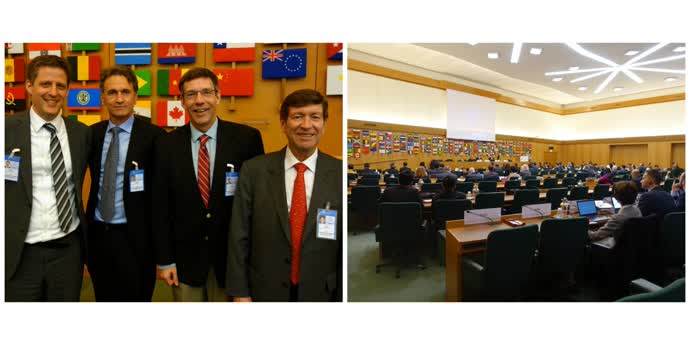
L: Members of the Canadian delegation, from left: Dominique D'Allaire, Prof. Rod Wood, Paul Morrison and Michel Deschamps.
R: The Unidroit meeting in progress.
A nine-page resume probably doesn't even begin to scrape the surface of Professor Rod Wood's 37-year career in law.
Wood joined the Faculty in 1987, where he teaches in the areas of bankruptcy and insolvency law, secured transactions law, commercial law and debtor-creditor law. His superb teaching skills were recognized when he received the Tevie H. Miller Teaching Excellence Award for the Faculty of Law in 2004, and the Rutherford Award for Excellence in Undergraduate Teaching for the University of Alberta in 2005.
In addition to his work at the Faculty, he was also previously a research officer at the Law Reform Commission of Saskatchewan and a Commissioner on the Law Commission of Canada. He presently serves as a board member on the Alberta Law Reform Institute.
Wood is also a founding member of the Conference on Canadian Personal Property Security Law, and he is currently working with other academics on proposals for legislative changes to the Personal Property Security Act (the Act has not undergone a significant review in Alberta since its coming into force in 1990).
Wood has had a long-standing interest in law reform. He said he enjoys the creative and challenging task of identifying problems in the law and trying to come up with a modern and simplified solution. But that doesn't mean there are not difficulties. Wood said one challenge with law reform is implementation, because even terrific ideas can sit and gather dust on the shelf as they wait for the right political moment.
Most recently, Wood participated in the UNIDROIT Committee of Governmental Experts meeting in Rome on March 20 to 24, 2017 for the preparation of a draft Protocol to the Convention on International Interests in Mobile Equipment on Matters specific to Agricultural, Construction and Mining Equipment (the "MAC Protocol"). The meetings were held at the Headquarters of the Food and Agriculture Organization of the United Nations.
The Cape Town Convention is designed to establish an international legal regime for the creation, enforcement, registration and priority of security interests in categories of high-value, uniquely identifiable mobile equipment. It takes a two-instrument approach - the Convention sets out the basic framework of rules, while the Protocols to the Convention supplement and in some cases modify the rules of the Convention in order to take into account the sector-specific considerations. Three Protocols have been created to date: one governing aircraft, another governing railway assets and a third governing space assets (the financing of satellites). The MAC Protocol that is being developed would be the fourth.
Wood, who previously worked on the Space Assets Protocol, and who was on the drafting committee of the Luxembourg Protocol in respect of railway assets, participated as a member of the Canadian delegation. The head of the Canadian delegation is Dominique D'Allaire of the Department of Justice, and the other members are Paul Morrison of the Department of Science, Innovation and Economic Development, and Michel Deschamps of McCarthy Tétrault.
When Wood is not busy teaching or lending his expertise across the globe, he enjoys scrambling in the Rocky Mountains with his family.